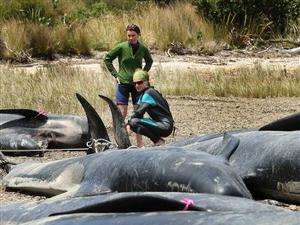TOKYO The star of “The Cove,” an Oscar winning documentary about a Japanese dolphin hunt, is back in Japan to protest the slaughter but had to cancel his trip to the village at the center of the controversy because of threats from an ultranationalist group.Instead, Ric O’Barry, the former dolphin-trainer for the 1960s “Flipper” TV show, is playing host to a reception Wednesday for some 100 animal-lovers at a Tokyo hotel.On Thursday, he will take a petition signed by 1.7 million people from 155 nations demanding the end of the dolphin hunt to the U.S. Embassy in Tokyo, escorted by police security.
The 70-year-old had initially planned to take the petition to the Japanese Fisheries Ministry. That was also canceled on advice from Japanese police.”I wish all these people could be in Taiji,” the small coastal village highlighted in the documentary, O’Barry told The Associated Press. “It was too dangerous. The big losers are the people of Taiji.”Taiji, which has a population of 3,500 people, defends the dolphin-killing as tradition and a livelihood. In the past, some of the captured dolphins have been sold to aquariums. Others are eaten as meat.
“The Cove,” which won this year’s Academy Award for best documentary, depicts a handful of fishermen from Taiji who herd a flock of dolphins into a cove and stab them to death, turning the waters red with blood.The Taiji dolphin hunt begins every year on Sept. 1, and a fishing group has confirmed that the hunt is on this year, although boats returned empty Wednesday.O’Barry and other conservationists have made trips before to the village around the beginning of the hunt to express their opposition to what they say is a cruel slaying of animals that are as intelligent as human beings.
His trip last year – covered by the AP – is being shown on the “Animal Planet” TV series in the U.S. starting this month. There are no plans to show the series in Japan.The message of “The Cove” has drawn support from nature-lovers around the world, including celebrities such as Jennifer Aniston, Courtney Cox and Robin Williams.
The Japanese government allows a hunt of about 20,000 dolphins a year, and it argues that killing them – and also whales – is no different from raising cows or pigs for slaughter.But conservationists disagree. Groups such as the U.S.-based Sea Shepherd have dogged the Japanese whale hunt – which the government allows for academic research but from which the meat is also sold – chasing whaling vessels in an effort to impede their operations.
O’Barry had initially planned outdoor rock-festival-like festivities in Taiji this year, bringing along movie stars who support him. But he can barely step out of his hotel room because of the threats, he said.”The Cove” opened in some Japanese theaters in June. Earlier, some screenings were canceled after getting a flood of angry phone calls and threats by far-right nationalists, who oppose the film as a denigration of Japanese culture.
Protesters have shown up at the distributor’s office in downtown Tokyo, shouting slogans. But many Japanese have never eaten dolphin or whale meat, and are horrified by the butchering of dolphins in “The Cove.””The documentary was shocking for Japanese,” said Akihiro Orihara, 40, who runs vegetarian restaurants in Tokyo and attended O’Barry’s reception. “We need information to be able to make our decision.”O’Barry said he has not given up and plans to be back every year.”Cruelty shouldn’t be the tradition or culture of any nation,” he said. (AP)


